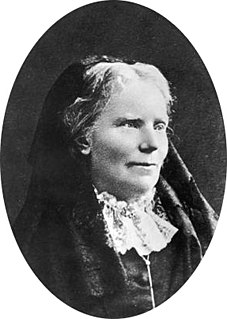A Quote by Bram Stoker
It is something like the way dame Nature gathers round a foreign body an envelope of some insensitive tissue which can protect from evil that which it would otherwise harm by contact. If this be an ordered selfishness, then we should pause before we condemn any one for the vice of egoism, for there may be deeper root for its causes than we have knowledge of.
Related Quotes
... overconfidence in one's own ability is the root of much evil. Vanity, egoism, is the deadliest of all characteristics. This vanity, combined with extreme ignorance of conditions the knowledge of which is the very A B C of business and of life, produces more shipwrecks and heartaches than any other part of our mental make-up.
I may say that here, as in most cases where the operations of nature interfere with the designs of man, it is not by a direct intervention on our part that we may remedy the difficulties, but rather by a precise knowledge of their causes, which may enable us, if not to check, at least to avoid the evil consequences.
The truest definition of evil is that which represents it as something contrary to nature; evil is evil because it is unnatural; a vine which should bear olive-berries, an eye to which blue seems yellow, would be diseased; an unnatural mother, an unnatural son, an unnatural act, are the strongest terms of condemnation.
Many of our miseries are merely comparative: we are often made unhappy, not by the presence of any real evil, but by the absence of some fictitious good; of something which is not required by any real want of nature, which has not in itself any power of gratification, and which neither reason nor fancy would have prompted us to wish, did we not see it in the possession of others.
Broader and deeper we must write our annals, from an ethical reformation, from an influx of the ever new, ever sanative conscience, if we would trulier express our central and wide-related nature, instead of this old chronology of selfishness and pride to which we have too long lent our eyes. Already that day exists for us, shines in on us at unawares, but the path of science and of letters is not the way into nature. The idiot, the Indian, the child, and unschooled farmer's boy, stand nearer to the light by which nature is to be read, than the dissector or the antiquary.
Evil denotes the lack of good. Not every absence of good is an evil, for absence may be taken either in a purely negative or in aprivative sense. Mere negation does not display the character of evil, otherwise nonexistents would be evil and moreover, a thing would be evil for not possessing the goodness of something else, which would mean that man is bad for not having the strength of a lion or the speed of a wild goat. But what is evil is privation; in this sense blindness means the privation of sight.
He that would travel for the entertainment of others, should remember that the great object of remark is human life. Every Nation has something peculiar in its Manufactures, its Works of Genius, its Medicines, its Agriculture, its Customs, and its Policy. He only is a useful Traveller, who brings home something by which his country may be benefited; who procures some supply of Want, or some mitigation of Evil, which may enable his readers to compare their condition with that of others, to improve it whenever it is worse, and whenever it is better to enjoy it.
Souls are punished when they have gone forth from the body, some wandering among us, some going to hot or cold places of the earth, some harassed by spirits. Under all circumstances they suffer with the irrational part of their nature, with which they also sinned. For its sake there subsists that shadowy body which is seen about graves, especially the graves of evil livers.
We are estranged from our own deeper physiology because we are no longer in contact with nature. Instead, we are controlling nature with air pollution, heating, technology. But you have to know you have a depth within yourself which needs to be stimulated. If it doesn't get stimulated it becomes weaker, like a muscle that's not being used any more.
[Necessity is] the sum of all things, which being now existent, conduce and concur to the production of that action hereafter, whereof if any one thing now were wanting, the effect could not be produced. This concourse of causes, whereof every one is determined to be such as it is by a like concourse of former causes, may well be called (in respect they were all set and ordered by the eternal causes of all things, God Almighty) the decree of God.
... regard this body as a machine which, having been made by the hand of God, is incomparably better ordered than any machine that can be devised by man, and contains in itself movements more wonderful than those in any machine. ... it is for all practical purposes impossible for a machine to have enough organs to make it act in all the contingencies of life in the way in which our reason makes us act.



































